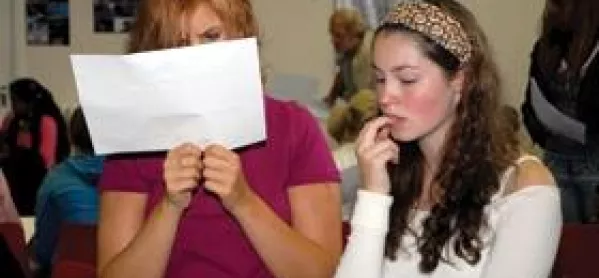GCSE deflation blamed on tactical exam entry

 GCSE grade deflation was confirmed this week as the proportion of “good” and top grades fell for a second consecutive year.
GCSE grade deflation was confirmed this week as the proportion of “good” and top grades fell for a second consecutive year.
But exam boards said the drops - particularly significant for A*-C grades, which fell from 69.4 per cent to 68.1 per cent, the lowest level since 2009 - can in large part be explained by significant increases in early and multiple entries and the use of the IGCSE.
Figures published yesterday lay bare the full extent of the tactics used by schools caught between tougher government targets and exam watchdog Ofqual’s clampdown on grade inflation.
This year’s results also reveal the apparent impact of the English Baccalaureate (EBac) performance measure, with huge increases in entries for foreign languages, geography and history. Chemistry, biology and physics entries were also up.
Across all subjects this summer there was a 39 per cent rise in entries from students who were aged 15 or younger.
In mathematics, the total number of entries this academic year amounted to nearly twice the number of 16-year-old students. More than one in 10 (89,353) candidates taking the subject this summer were being entered for the third time. Two students had been entered eight times.
Overall the proportion of entries achieving the top A* grade fell from 7.3 to 6.8 per cent. The fall is partly explained by younger candidates’ lower results and by migration to IGCSE, where grades have been higher. Last year’s drop in top grades ended 23 years of continuous improvement since GCSEs were first sat in 1988.
Today exam boards believe that combined GCSE and IGCSE statistics are a more accurate measure of student performance.
Top A-level grades have also fallen for the past two years after decades of rising results, as Ofqual has intensified its “comparable outcomes” clampdown on grade inflation. School leaders are concerned about the impact of the watchdog’s approach on their ability to meet government GCSE targets.
“Schools are constantly trying to improve outcomes for pupils, whereas Ofqual and the exam boards are geared to making sure that there is no room for improvement,” said Kathy James, director of policy at the NAHT headteachers’ union. “The accountability system is built around a measure that our members don’t trust any more.”
English and English language - the subjects at the centre of last year’s grading controversy, which culminated in an unsuccessful High Court challenge after tens of thousands of students received lower than expected grades - experienced a fall in overall results this summer. The picture improves when early entries are removed but that may not alleviate some schools’ concerns.
In mathematics, the proportion of entries from under-16s increased by 49 per cent and accounted for more than a fifth of this summer’s results in the subject, contributing to lower grades.
Richard Browne, a member of the Advisory Committee on Mathematics Education, which represents academics and teachers, said: “Early entry has a negative effect on most students’ mathematical education and hinders their progression to a wide range of subjects post-16 and in higher education.”
This week, the Department for Education said its GCSE reforms would help to stop schools “gaming the system” with early and multiple entries that were “not good for pupils and should not happen”.
Entries for biology, chemistry and physics were up by 5 per cent, 4.4 per cent and 2.1 per cent respectively, but results were down, as expected. Exam boards said this could be explained by tougher new specifications, higher-achieving candidates moving to IGCSE, more early entries and entries from lower-achieving students who would previously have taken combined sciences.
The GCSE languages revival has gathered pace with spectacular increases in entries for French (15.5 per cent), German (9.4 per cent) and Spanish (25.8 per cent). Entries for geography and history also rose hugely, by 19.2 and 16.7 per cent respectively.
The big increases are likely to be explained by the EBac, which requires passes in a language and history or geography. This year’s cohort is the first to complete a full, two-year GCSE course since the measure was announced. But religious education, which is not included in the EBac, continued to grow in popularity, with a 10.4 per cent increase.
Girls widened their lead over boys at A* and A*-C. Northern Ireland retained its top spot among the three individual nations, bucking the trend at A*-C with an increase from 75.6 to 76.5 per cent. Wales finished bottom.
DOWNWARD TRENDGCSE- 6.8% of entries achieved A* (7.3% in 2012)
- 21.3% achieved A-A* (22.4% in 2012)
- 68.1% achieved A*-C (69.4% in 2012)
- 72.3% of girls’ entries achieved A*-C (73.3% in 2012)
- 63.7% of boys’ entries achieved A*-C (65.4% in 2012)
- GCSE and IGCSE combined
- 8.2% of entries achieved A* (8.3% in 2012)
- 68.7% achieved A*-C (70% in 2012).
GCSE- 6.8% of entries achieved A* (7.3% in 2012)
- 21.3% achieved A-A* (22.4% in 2012)
- 68.1% achieved A*-C (69.4% in 2012)
- 72.3% of girls’ entries achieved A*-C (73.3% in 2012)
- 63.7% of boys’ entries achieved A*-C (65.4% in 2012)
- GCSE and IGCSE combined
- 8.2% of entries achieved A* (8.3% in 2012)
- 68.7% achieved A*-C (70% in 2012).
- 6.8% of entries achieved A* (7.3% in 2012)
- 21.3% achieved A-A* (22.4% in 2012)
- 68.1% achieved A*-C (69.4% in 2012)
- 72.3% of girls’ entries achieved A*-C (73.3% in 2012)
- 63.7% of boys’ entries achieved A*-C (65.4% in 2012)
- GCSE and IGCSE combined
- 8.2% of entries achieved A* (8.3% in 2012)
- 68.7% achieved A*-C (70% in 2012).
Keep reading for just £1 per month
You've reached your limit of free articles this month. Subscribe for £1 per month for three months and get:
- Unlimited access to all Tes magazine content
- Exclusive subscriber-only stories
- Award-winning email newsletters



